每日观察:关注Kabam推《教父》主题社交游戏(8.26)
1)据AppData数据显示,EA最新社交游戏《模拟人生社交版》最近DAU已达460万(在发布首周就已收获260万,并于8月25日当天新增120万用户),与此同时,Zynga游戏《Empires & Allies》却在日前流失了32.8万DAU,《FrontierVille》(它刚推出扩展游戏内容《Pioneer Ville》)也流失了22万DAU。
venturebeat报道称,EA这款新游戏无异于对常年不败的Zynga游戏形成挑战。《模拟人生》原版游戏销量至今已达1.4亿份,总共创造了约30亿美元收益。据AppData数据显示,在《模拟人生社交版》登陆Facebook之前,EA约有2900万MAU,但现在已达3460万MAU,超过了德国社交游戏开发商Wooga的3400万MAU。
2)据venturebeat报道,Facebook游戏开发商Kabam已和派拉蒙公司达成协议,正制作一款以电影《教父》为题材的黑帮游戏《The Godfather:Five Families》,并将于今年秋季正式发布游戏。
奥斯卡获奖电影《教父》由Francis Ford Coppola于1972年制作,EA曾开发了两款以该电影为题材的游戏,但Kabam的这个合作项目却是《教父》游戏首次被搬上Facebook平台,该电影页面在Facebook已有480万粉丝。
据Kabam旧金山游戏工作室总经理兼游戏执行制作人Larry Koh所称,公司已专门指定一个大团队全力开发该游戏。观察者认为该游戏有可能向Zynga同类游戏《Mafia Wars》发起挑战,但打败《Mafia Wars》并非易事,毕竟后者当前MAU已经超过2000万。据Kabam介绍,这款新游戏与其他Facebook游戏的不同之处在于,它采用的是同步玩法。该游戏将植入城市建设元素,支持玩家加入5个犯罪家族之一,参与在纽约的金钱、权力和名誉抢夺大战,最终在同辈中脱颖而出成为令人敬畏的“Don”或者犯罪家族的首领。这款游戏将于未来数周进行内部测试。
3)动作冒险游戏《Hello Adventure》是Free Lunch Design最新开发的Facebook游戏,采用了《暗黑破坏神》和《Torchlight》等游戏的相关元素,但锁定的却是休闲游戏玩家,据AppData数据显示,该游戏最近的MAU是15万6196,DAU是8325。
玩家在游戏中需演一名年轻的探险者,一路打败怪物,寻找珍宝并获取经验值。玩家只有闯过特定关卡,并招集一定数量的好友作为邻居,才有可能挑战之后的任务。玩家打败敌人时,就可以搜集它们掉下来的金子、经验值、道具和可以增加攻击力的能力等物品。
该游戏社交功能包括发布消息,赠送道具和建筑物品,并支持玩家之前共享金子和经验值等特定道具。
4)据gigaom报道,游戏化已经不再是基于地理定位服务(LBS)的主要魅力所在,高度依赖游戏化的初创企业已开始面临运营瓶颈。
Gowalla日前宣布移除今后发布应用中的所有虚拟商品,据其首席执行官Josh Williams所称,仅有不到0.5%的活跃用户曾使用过这些虚拟商品。
他表示让用户通过现实世界的互动解琐虚拟商品是一个好主意,它在Gowalla创立之初时发挥了很大作用,但现在这种游戏化功能却给用户带来了干扰而非乐趣,所以Gowalla现在主要着眼于帮助用户探索世界的实用功能。
另一家LBS公司SCVNGR的宗旨是创建一个游戏层,邀请人们体验和创造LBS游戏,但该公司近日与LevelUp折扣服务的合作,却表明游戏本身的吸引力其实很有限,折扣服务市场更具发展潜力。
Foursquare也向游戏化之外的领域迈进了一步,通过Explore标签推出了更多推荐服务,还有不少LBS公司也先后与Groupon和Living Social等团购服务进行合作,这一切迹象表明游戏曾经是人们签到LBS的首要理由,但现在人们已经有了更多选择。
观察者认为这些现象表明LBS市场正走向成熟,游戏化机制需提供比徽章和虚拟商品更具实际意义的服务,才能成为用户采取某种行动的刺激因素,并且为LBS公司创造收益。
5)据insidesocialgames报道,显示于Facebook游戏页面、好友游戏列表的新App Ticker功能将可展示简略版的Facebook社交广告内容。广告主可购买这些赞助广告,通过App Ticker和常规的Facebook广告工具条,通知用户他们的好友正在使用哪些应用(如下图所示)。
在本月初Facebook推出App Ticker之前,用户只有浏览Facebook时才会看到出现于广告工具条的这类赞助性内容(如下图所示)。但现在游戏玩家可以在自己的App Ticker中看到标记为“Sponsored”的内容,它会显示用户好友的头像和姓名,及其使用的游戏和应用名称,但不会出现游戏和应用的图片。页面和网站的赞助广告也会出现在App Ticker之中,但目前数量较少。
这一设置将增加广告主和开发者获取游戏玩家的机会,但要让这些赞助广告更具效能,Facebook还需要向他们展示哪些对象才是用户所信赖的好友和游戏玩家。假如Facebook能够在App Ticker赞助广告中实现这一功能,才会更有助于购买这些广告的开发者实现目标,从而促使开发者对社交广告中加入大投力度。
6)社交游戏开发商Wooga首席执行官Jens Begemann日前表示,他认为Facebook平台的30%抽成并非值得烦恼的大事。他称Facebook是一个免费的平台,开发者可以免费使用其中的沟通渠道,通过病毒式传播获得用户,只有游戏产生利润后才需要向Facebook支付30%收益,这是一桩公平的交易。
他表示Wooga虽然已经向Google+发布三款游戏,但Facebook仍是其关注重点,他们不会放缓在Facebook的前进步伐。
7)据games报道,以Suzanne Collins所著的成人畅销书《饥饿游戏》三部曲(游戏邦注:The Hunger Games,该书连续130周登上《纽约时报》排行榜,已被译成26种语言在38个地区或国家发售)改编的Facebook游戏《The Hunger Games: Training Days》于去年8月问世,但不到两个月就被迫下线,其粉丝页面的相关评论都被屏蔽。
不过据该游戏的Facebook粉丝页面传言称,由于该书的电影版(由Lionsgate Entertainment公司制作)将于明年三月首映,所以这款游戏有可能在今年9月份重返Facebook。(本文为游戏邦/gamerboom.com编译,如需转载请联系:游戏邦)
1)Electronic Arts’ The Sims Social hits 4.6 million daily players a week after launch
Matthew Lynley
Electronic Arts’ latest Facebook game, The Sims Social, has picked up more than 4.6 million daily active users after launching a week ago, according to AppData.
The Sims Social was the fastest growing social game this week, picking up 2.6 million daily active users as of the beginning of the week and 1.2 million daily active users today alone. That’s compared to Zynga’s smash hit Empires & Allies, which lost around 328,000 daily active users today. Frontierville, another Zynga game that recently released a new sub-game called Pioneer Ville, lost around 220,000 daily active users today, according to AppData.
Electronic Arts’ newest social game looks like it will give Zynga — which hasn’t really faced any stiff competition in Facebook games — a run for its money. That’s because the game has a massive franchise and name behind it, along with a development team that has a pretty stellar track record. EA has sold more than 140 million copies of the The Sims and its sequels and expansion packs and has generated around $3 billion in revenue from it.
The Sims Social is basically a lightweight version of The Sims built into a browser on Facebook. The team behind The Sims and casual games maker Playfish both worked on the game. Electronic Arts bought Playfish in 2009 when it was vying with social games maker Zynga for the top social gaming spot. Zynga has since lurched ahead and claimed the top spot, with 264 million monthly active.
Before The Sims Social launched, Electronic Arts had around 29 million monthly active users, according to AppData. The company has since risen to around 34.6 million monthly active users, passing social gaming company Wooga (which has around 34 million monthly active users).
The Sims was a smash hit with casual gamers because it was a very light game that was easy to get into and offered a lot of depth. You basically control a “sim” as it lives its life and try to achieve lifetime goals — which lets gamers accomplish whatever they want to do in the game. The games are known for having tongue-in-cheek humor and sharp writing.
Electronic Arts has not-so-quietly established a fierce casual and social gaming team. The company bought Playfish back in 2009 and also bought casual games maker PopCap for $750 million. Both teams have made successful games, and once the PopCap deal closes, there’s a good chance Playfish will be working with casual games maker PopCap.(source:venturebeat)
2)Kabam is going Hollywood. The hardcore Facebook game publisher is announcing today that it has a deal with Paramount to make an empire-building social game based on the Godfather mafia films. The new game is called The Godfather: Five Families and it will debut later this fall.
The title is a big departure for Kabam, which has relied to date on its own original titles. But this Godfather title is going up some very established competition such as Zynga’s Mafia Wars game on Facebook. So Kabam secured an official license from Paramount Digital Entertainment, the owner of the Oscar-winning Godfather films created by Francis Ford Coppola starting in 1972. Electronic Arts made two high-profile video games based on the Godfather series, but this is the first time such games will be made on Facebook, the largest social network with more than 750 million users. About 4.8 million of those users have become fans on the Facebook Godfather page.
That’s why Kabam has pulled out the stops on the game, dedicating a large team to work on the title over the past six to nine months, said Larry Koh, general manager of one of Kabam’s game studios in San Francisco and executive producer of the game, in an interview.
“We felt there was an opportunity for a true massively multiplayer online game,” Koh said.
Film-based video games have largely fallen out of favor with fans, who have become tired of superhero games, and with publishers, who balk at the costs of making the games and security the license. But Facebook games can be made for a lot less money. And the timing for the license worked out well since Paramount was looking for a way to introduce the film to younger viewers via social networks.
It won’t be easy for Kabam to take on Mafia Wars, which has more than 20 million monthly active users. Kabam’s games aren’t graphically awesome in terms of moving animations, but they are very social, with many players joining alliances and fight simultaneous battles in real-time. But the games do feature some very cool and realistic still frame art, like those pictured in this story. And they stand out in terms of the ability to communicate and play with other players at the same time, despite the computing limitations of games on Facebook. Kabam has added interesting animated effects, such as clouds floating above the city and trains rolling through the city.
“Our ability to make this different from other crime games is based on pushing heavily on synchronous play,” Koh said.
Kabam is going to apply that same kind of successful empire-building game mechanic to The Godfather. Players can join one of five crime families that battle for money, power, and respect in the neighborhoods of New York. Within the families, players can join “crews” of players, and eventually try to become the“Don,” or head of the crime family. Players have to recruit friends, build resources, and fight other factions for control of territory in New York City. Kabam says it will add new social game play features designed specifically for the game, theme and story. The story is an open-ended one that will allow players to create their own destinies.
Kabam has opened registration for a closed beta test of the game. Beta tests are expected to begin in several weeks. The title will be free-to-play, where users can play for free and pay real money for virtual goods.(source:venturebeat)
3)Facebook Welcomes Social Game Hello Adventure From Free Lunch Design
By Randy Nelson
Action-adventure Hello Adventure is the latest Facebook offering from Free Lunch Design. The game is reminiscent of dungeon crawlers such as Diablo and Torchlight, with mechanics specifically targeted toward casual players.
According to our traffic tracking service AppData, Hello Adventure currently has 156,196 monthly active users and 8,325 daily active users.
Players are cast as a young adventurer out to defeat monsters, find treasure and gain experience. The game is divided into dozens of levels spread across seven sections of a world map. Later levels can only be accessed once a player has reached a certain level and recruited a certain number of friends as in-game neighbors. Within these levels, players explore and battle enemies by clicking on them. Once defeated, the enemies leave behind copious amounts of loot — gold, experience points, items and abilities that change the combat dynamic (e.g. adding ranged attacks).
Social features include Wall posts, gifting items, and gifting construction items. It’s also possible to share certain items, such as gold and experience points, as players level up.(source:insidesocialgames)
4)No more fun and games: Location grows up
By Ryan Kim
Tweet inShare21When check-in services first appeared on the scene, they were often understood in the context of games, like Foursquare’s mayor competitions and Gowalla’s quests for items and pins. But as location-based services grow up, we’re seeing that games are not necessarily the most appealing aspect of location, and it seems like start-ups are acknowledging that they’re also tough to build a business on.
The latest example of businesses shying away from location-based games is Gowalla’s announcement today that it is doing away with items in its next release of the app. The items were virtual goods picked up by users for visiting locations, which could then be traded or left for other users. Gowalla’s CEO Josh Williams said items were used by less than half a percent of its active users.
He said virtual goods unlocked through real world interaction is a remarkable idea, and one that helped Gowalla get its start. But now it causes more distractions than joy for most. What Gowalla will focus more on is helping people explore the world, in keeping with its passport theme.
SCVNGR, another location service that wants to build a game layer on top of the world, invites people to play and create location-based games. But these days, the big news for SCVNGR is around LevelUp, a daily deal program that uses some game mechanics to build consumer loyalty for merchants. LevelUp’s game elements are more limited, however, and consist mainly of establishing three daily deals instead of just one to ensure that consumers come back to a business.
SCVNGR still has a business built off its traditional gaming model but it seems like that real dollars are in tapping local advertising dollars through LevelUp. SCVNGR’s move with LevelUp seems to acknowledge that games by themselves have a limited appeal, and that the real opportunity is in improving on the daily deal market.
Foursquare also has also moved beyond games and is focusing on more recommendation services through its Explore tab. More recently, it rolled out a list function for curating and sharing locations and event check-ins, which allow people to use Foursquare as more of a digital scrapbook. And the company’s been lining up big daily deal discount partnerships with Groupon and Living Social, too. As Foursquare co-founder Dennis Crowley told me last week, the check-ins were the first step in building up a user behavior that can unlock a lot of other services and features. Games were the first reason to check-in, but now there are plenty of other reasons to do so.
What it all means is that location is maturing, and while there is still a place for games, location-based services are becoming more about business. Which makes sense, because these companies are interested in making money first and foremost. We’ll still have game mechanics, and other start-ups might come along with even better ideas on how to use games and virtual items, something others have argued that Gowalla didn’t manage well enough. And gamification can still work as a motivational force for all kinds of behavior, though it needs to consist of more than just badges and virtual goods.
As Gowalla’s Williams points out, there’s a lot more to location than games. A JiWire survey last year found that scoring points was the least popular reason for checking into a location, while getting a deal was the most popular motivator. There’s so much opportunity for end users in terms of discovering the world, documenting travels, unlocking deals and finding people nearby. And many of these things are easier to monetize for companies, too. So while I don’t think we’ve seen the end of games in location, it looks like we’re moving on to bigger ideas and more lucrative opportunities.(source:gigaom)
5)Facebook’s Sponsored Stories Ads Appear in the New App Ticker
By AJ Glasser
Facebook’s new App Ticker that is displayed on the games Canvas page and lists news of friends engaging with games will also show abbreviated versions of Sponsored Stories, Facebook’s social ad unit. Sponsored Stories bought by advertisers are now eligible to inform users about the app their friends use from within the App Ticker as well as from their regular spot in Facebook’s ads sidebar. This is currently the only way that ads are mixed into any of Facebook’s content streams.
This additional placement of Sponsored Stories will improve the ability of advertisers to reach gamers, which could be especially useful for developers looking to gain new users. However, to make the ticker’s sponsored app discovery stories as appealing as possible, Facebook will need to show them about friends that users trust as wise, active gamers.
Until the launch of the App Ticker earlier this month, Sponsored Stories only appeared in the ads sidebar to users browsing Facebook. Now, gamers will see entries in their App Ticker marked “Sponsored”. These are in fact the same Sponsored Stories, albeit in a condensed format that just shows the name and face of a user’s friend and the title of an app or game they’ve used, but no image of the app or game. Sponsored Stories about Pages and websites may also appear in the App Ticker, though we’ve only seen ones about apps and games so far.
If Facebook can surface trusted gamers in App Ticker Sponsored Stories, developers buying them will see better performance. This could make the ticker an important paid growth channel in addition to driving free, organic growth, leading developers to spend more on the social ad unit.(source:insidesocialgames)
6)Wooga CEO: ‘I don’t think the 30 percent Facebook share is an issue’
by Joe Osborne
Well, I guess neither do the legions of iOS game makers. Jens Begemann, CEO of Berlin-based Diamond Dash creator Wooga, defended Facebook’s 30 percent cut it takes from Facebook Credits in an interview with GamesIndustry.biz. The chief of the fourth largest social games company on Facebook outright said that he doesn’t think the 30 percent is an issue. (The company just released yet another Facebook game, Magic Land, with plans for mobile expansion.)
“The whole Facebook platform is free, you’ve got tons of communication channels, you’ve got lots of viral communication to users, it’s an amazing platform and you have traffic that’s worth millions of dollars, and you get all of that for free,” Begemann told GamesIndustry.biz. “And only when you’re successful do you pay your 30 per cent revenue share. So it’s fair.”
Wooga helped boost the recent launch of Google+ Games with ports of three of its biggest games: Bubble Island, Monster World and Diamond Dash. Begemann went on to say that Wooga’s presence on Google+ Games, which currently only charges game developers 5 percent of revenues from purchased in-game goods, is not mutually exclusive. “But we remain very very committed to Facebook,” he said. “We will not slow down there.”(source:games)
7)The Hunger Games Facebook game rumored to return this September
by Jenny Ng
Lionsgate Entertainment’s The Hunger Games film wrapped up casting before the summer began and set for release next March. Part one of a trilogy, this film is an adaptation of Suzanne Collins’ bestselling young adult book series, which has the NY Times list for over 130 consecutive weeks, been translated into 26 languages, and sold in 38 countries. So it’s no surprise that it’s got a Facebook game too, called The Hunger Games: Training Days. Moreover, the Facebook game is actually an adaptation of the official tabletop board game by the National Entertainment Collectibles Association (NECA).
Developed by Icarus Studios (who brought us the Dexter Facebook game in July), The Hunger Games: Training Days arrived on Facebook last August as a card-based strategy game that came with a ticket system promising “cool real world gear”, such as “the Limited-Edition Super-Exclusive ‘Down with the Capitol!’ Journal”. Unfortunately, the game didn’t last two months before it had to be taken down. And everything related to the game appears to be abandoned, comments on fan pages remain ignored, and anyone who checks out the game gets the following image:
But there’s hope for fans. Recently, a rumor on the Facebook game’s official fan page claims the game will return in September, even though a NECA representative in February responded that the game “is back in development mode” and that they are “preparing something different for release”. It sounds like major changes are in store for the game and as we get closer to the film’s release date, the folks invested in this might choose to step up their game (pun intended, of course). People who are curious about the original version can check out this old tutorial on the game’s website. (source:games)



























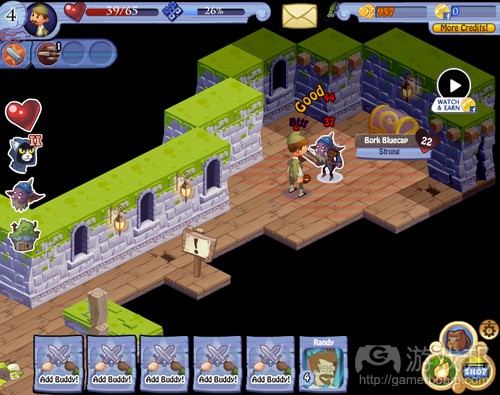
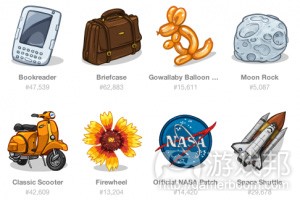
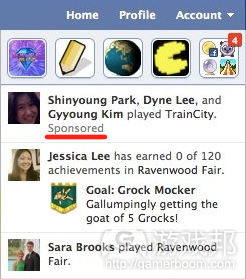

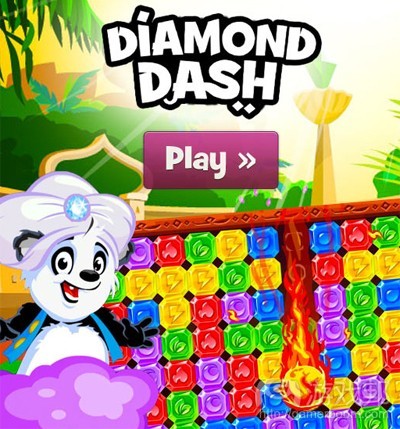
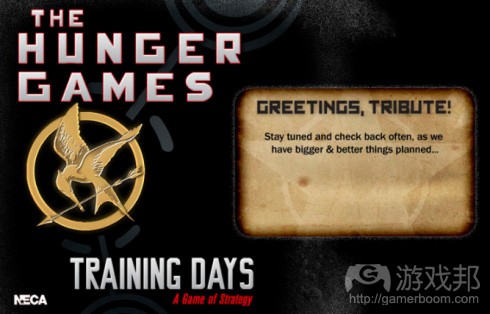














 闽公网安备35020302001549号
闽公网安备35020302001549号